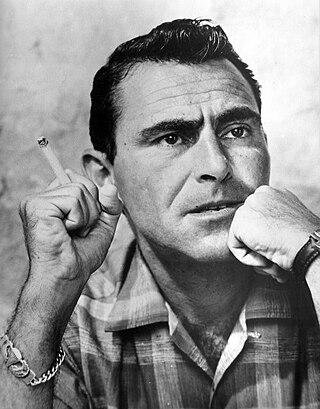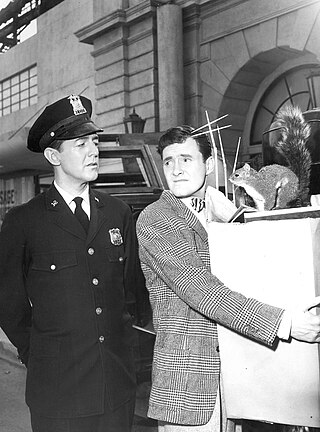
Rodman Edward Serling was an American screenwriter and television producer best known for his live television dramas of the 1950s and his anthology television series The Twilight Zone. Serling was active in politics, both on and off the screen, and helped form television industry standards. He was known as the "angry young man" of Hollywood, clashing with television executives and sponsors over a wide range of issues, including censorship, racism, and war.
"Walking Distance" is episode five of the American television series The Twilight Zone. It originally aired on October 30, 1959. The episode was listed as the ninth best episode in the history of The Twilight Zone by Time magazine.

"Time Enough at Last" is the eighth episode of the American anthology series The Twilight Zone, first airing on November 20, 1959. The episode was adapted from a short story by Lynn Venable, which appeared in the January 1953 edition of If: Worlds of Science Fiction.
"I Shot an Arrow into the Air" is the fifteenth episode of the American television anthology series The Twilight Zone.

"A Stop at Willoughby" is episode 30 of the American television anthology series The Twilight Zone. Rod Serling cited this as his favorite story from the first season of the series.

"Mr. Bevis" is episode thirty-three of the American television anthology series The Twilight Zone. It first aired on June 3, 1960 on CBS. This episode is one of only four to feature the "blinking eye" opening sequence, and the first to feature the opening narration which would be used for every episode throughout season 2 and 3. The episode was an unsuccessful television pilot.
"The Man in the Bottle" is episode 38 of the American television series The Twilight Zone. It originally aired on October 7, 1960, on CBS.
"Nervous Man in a Four Dollar Room" is episode 39 of the American television anthology series The Twilight Zone. It originally aired on October 14, 1960, on CBS.
"A Thing About Machines" is episode 40 of the American television anthology series The Twilight Zone. It originally aired on October 28, 1960, on CBS.
"A Penny for Your Thoughts" is episode 52 of the American television anthology series The Twilight Zone, written by George Clayton Johnson. It originally aired on February 3, 1961, on CBS.
"The Night of the Meek" is episode 47 of the American television anthology series The Twilight Zone. It originally aired on December 23, 1960, on CBS. It was one of the six episodes of the second season which were shot on videotape in a short-lived experiment aimed to cut costs.
"The Mind and the Matter" is episode 63 of the American television anthology series The Twilight Zone. It originally aired on May 12, 1961 on CBS.

"Nightmare at 20,000 Feet" is the third episode of the fifth season American television anthology series The Twilight Zone, based on the short story of the same name by Richard Matheson, first published in the short story anthology Alone by Night (1961). It originally aired on October 11, 1963, and is one of the most well-known and frequently referenced episodes of the series. The story follows a passenger on an airline flight who notices a hideous creature trying to sabotage the aircraft during flight.

"The Bard" is an episode of the American television anthology series The Twilight Zone. It was the final episode of The Twilight Zone to be one hour long. A direct satire of the American television industry, the episode features a parody of Marlon Brando by Burt Reynolds, and concerns an inept screenwriter, who through the use of black magic, employs William Shakespeare as his ghostwriter.

"The Last Night of a Jockey" is an episode of the American television anthology series The Twilight Zone. In this episode, a diminutive jockey's wish to be a big man is granted. Rod Serling wrote the episode specifically for Mickey Rooney, who is the only actor to appear in it.
"Four O'Clock" is episode 94 of the American television anthology series The Twilight Zone.
"Steel" is an episode of the American television anthology series The Twilight Zone. Set in the near future, its premise is that human professional boxing has been banned and replaced by android boxing. The story follows a once-famous human boxer who works as a manager for an antiquated android while struggling to come to grips with his career having been taken over by machines.

Murray Hamilton was an American stage, screen and television character actor who appeared in such films as Anatomy of a Murder, The Hustler, The Graduate, Jaws and The Amityville Horror.

"Hocus-Pocus and Frisby" is episode 95 of the American television anthology series The Twilight Zone.
"The Fear" is the penultimate episode of the American television series The Twilight Zone. It is the last episode written by series creator/host Rod Serling.









